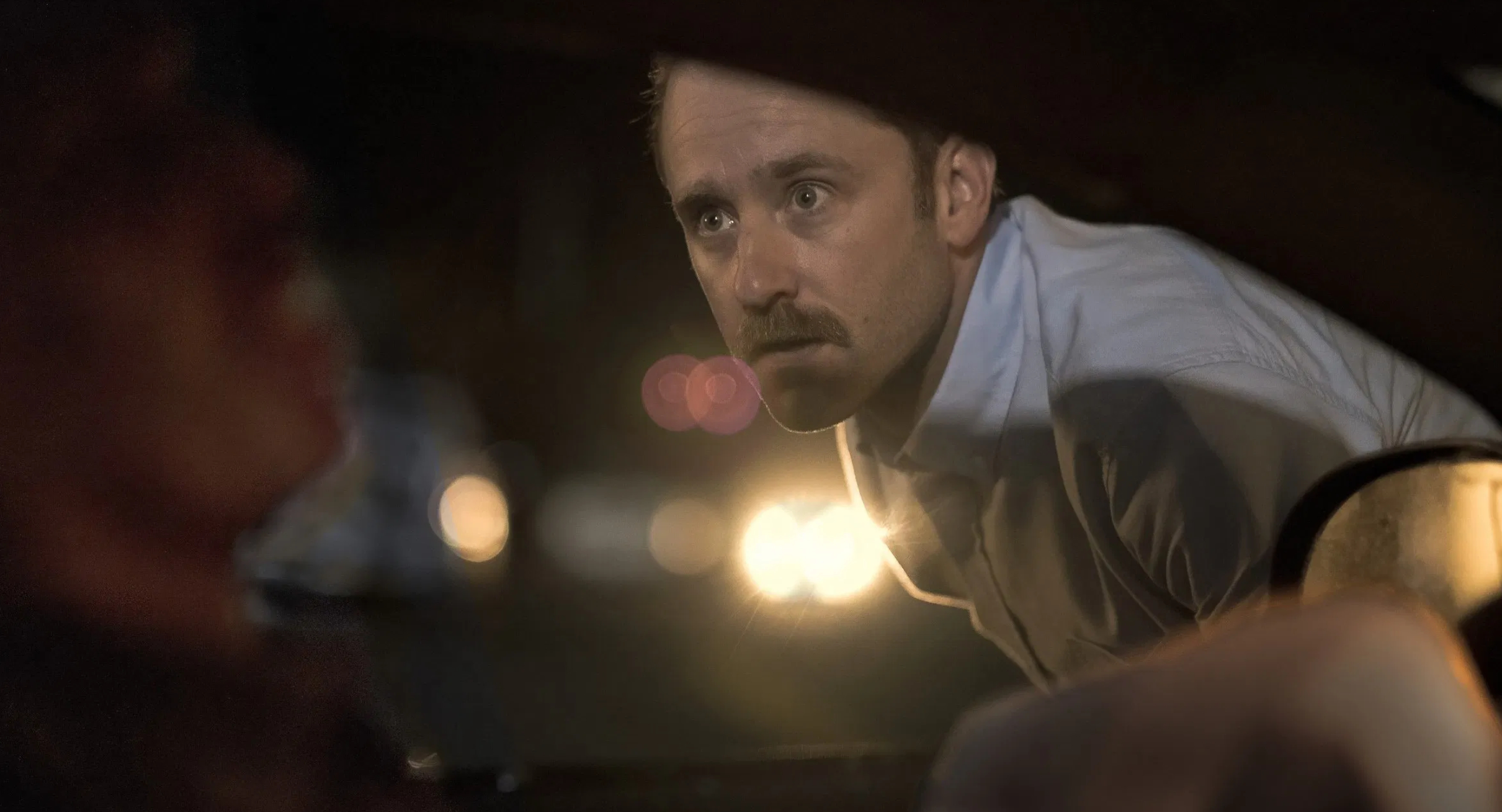Sharp Corner – Film Review
Published May 16, 2025

Directed by Jason Buxton, Sharp Corner is a taut, quietly unnerving thriller that turns an unassuming roadside hazard into the crucible of a man’s unraveling psyche. Adapted from Russell Wangersky’s 2012 short story, the film is an introspective, slow-burn character study disguised as a psychological thriller. Anchored by a mesmerizing performance from Ben Foster, Sharp Corner explores the ways in which trauma, guilt, and the illusion of control can metastasize into obsession—and how that obsession can erode everything it touches.
At the heart of the story is Josh McCall (Foster), a devoted husband and father whose home overlooks a treacherous bend in a rural stretch of road—a sharp corner that has claimed more than its fair share of accidents. What begins as a neighborly impulse to help evolves into a compulsion: Josh meticulously monitors the curve, keeps a log of incidents, installs lights, and even begins timing traffic patterns. He becomes the self-appointed guardian of the corner, leaping into action at any sound of screeching tires, sirens, or headlights breaking through the darkness.
Buxton’s direction maintains a chilly restraint, mirroring Josh’s own repressed emotional state. The film’s early scenes present a portrait of normalcy—Josh working in the garage, eating dinner with his wife Rachel (Cobie Smulders), playing with their son Max (William Kosovic). But that veneer slowly peels away. Buxton frames the corner almost like a character itself: ever-present in the background, ominously still in the daytime and unsettlingly alive at night. The way Josh stares at it—silent, contemplative, wary—tells us more than exposition ever could.
Foster, one of the most underappreciated actors of his generation, gives a nuanced and deeply internalized performance. He eschews showiness in favor of a tight, coiled intensity. Josh isn’t ranting or visibly unhinged; rather, he’s a man quietly drowning under the weight of purpose he’s assigned himself. His compulsion is wrapped in altruism—who could fault someone for wanting to save lives?—but Foster lets us glimpse the darker undertones: the pride, the control, the sense of self-worth that begins to hinge on each life saved, or worse, each life lost.
Cobie Smulders brings grounded warmth to Rachel, a woman trying to be supportive while growing increasingly concerned about her husband’s mental state. She is not merely a passive observer. Smulders captures Rachel’s slow transition from empathetic partner to someone fearful of the distance growing between them. Her frustration never feels shrill or nagging—it’s anchored in a genuine fear that the man she married is slipping into something unrecognizable. Their scenes together carry the emotional weight of a marriage imperiled not by infidelity or abuse, but by something harder to name: obsession wearing the mask of purpose.
William Kosovic delivers a quietly effective performance as Max, their young son. He isn’t overused as a dramatic pawn, but his presence subtly raises the stakes. Through Max, Buxton underscores the risk of generational damage—what happens when a child witnesses their protector slowly become consumed by forces beyond their control?
The film’s pacing is deliberate, even meditative. Buxton favors long takes, ambient sound design, and a muted color palette that matches Josh’s emotional desaturation. There’s no bombastic score telling us what to feel—just the whine of tires, the static hum of a police radio, and the cold silence of waiting. Some viewers may find the film’s restraint frustrating, especially if they come expecting traditional thriller tropes. Sharp Corner is more interested in internal tension than external action. Even its climactic moments are subdued, though no less moving.
One of the film’s thematic strengths lies in its exploration of masculinity and control. Josh, a man of few words, finds meaning not through dialogue or intimacy but through action. Saving people becomes his language. Yet, his inability to control outcomes—even after so much effort—erodes his sense of identity. This is where the adaptation from Wangersky’s short story shines: Buxton preserves the intimate point of view while using film’s visual language to externalize Josh’s mental fragmentation.
Still, the film is not without its shortcomings. While its slow burn is largely effective, some sequences—especially in the second act—begin to feel repetitive. The visual motif of headlights rounding the corner at night starts to lose impact when overused.
Moreover, some viewers may crave more backstory. The film drops subtle hints about past trauma or guilt that may be driving Josh’s obsession, but it never confirms or elaborates. While this ambiguity can be powerful, it also risks feeling opaque, particularly in a story so dependent on psychological clarity. A flashback or more concrete emotional context—without tipping into melodrama—might have deepened our understanding of Josh’s motivations.
Despite these quibbles, Sharp Corner remains a deeply engrossing psychological thriller that lingers after the credits roll. Buxton’s filmmaking is confident and thoughtful, more concerned with tone and texture than spectacle. His ability to draw strong, subtle performances from his cast—particularly Foster—is key to the film’s impact.
What makes Buxton’s film stand out is its grounding in something deceptively mundane: a dangerous road, a good man, a noble mission. But when that mission becomes a fixation, the very thing that defines you can also destroy you.
Sharp Corner is a slow-burning, character-focused thriller that probes the dark side of altruism and obsession. It’s not a film for those seeking thrills and twists at every turn, but for viewers drawn to intimate portraits of psychological decay, Buxton’s film delivers a chilling and resonant experience. Anchored by Ben Foster’s restrained yet haunting performance, Sharp Corner reminds us that sometimes, the most dangerous curves are the ones inside the mind.
